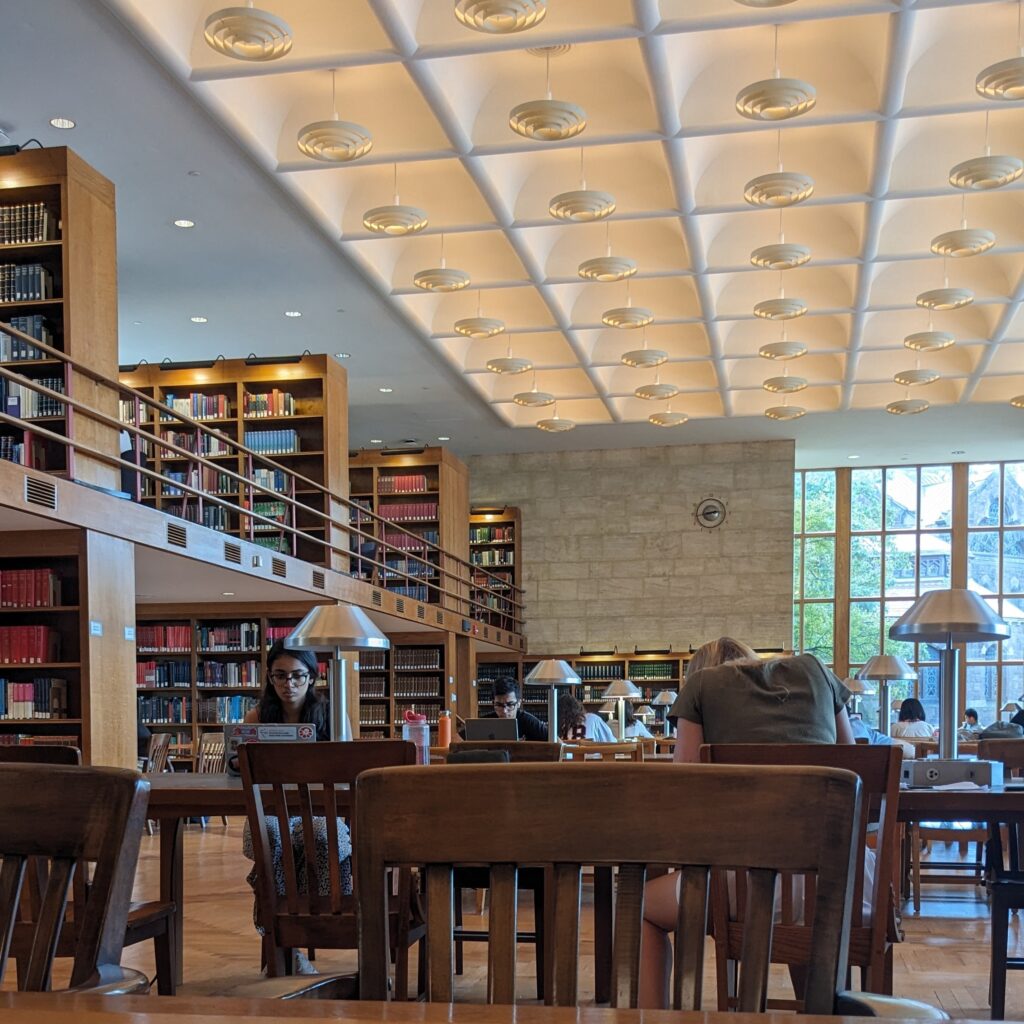Most people probably know Trustee Reading Room as that large room with big glass windows on the first floor of Firestone, where you go when you want a really quiet study space. Perhaps you’ve recently studied for midterms or worked on a paper in its sacred silence. Maybe you’ve wondered if there’s more to Trustee than simply providing a quiet atmosphere for study. The answer to that question is: yes, there is. It is the primary reference room of Firestone library– and if you read to the end of this article you will learn how to make the most of this tremendous resource.

Trustee Reading Room in Firestone Library has many reference works
What can you find in a reference room?
Most people, when they hear the words “reference room”, probably imagine a room with some dictionaries, the Encyclopedia Britannica, and other collections of imposing books which nobody is allowed to check out. While the Trustee reading room certainly has no shortage of Merriam-Webster dictionaries on its shelves, it is also home to a massive collection of specialized encyclopedias– encyclopedias devoted to a specific area. These works are especially helpful if you want concise information on a very detailed topic. Interested in film? Trustee has multi-volume works like the Schirmer Encyclopedia of Film, the Encyclopedia of Documentary Film, the Comprehensive Encyclopedia of Film Noir, the Encyclopedia of Early Cinema, and many other detailed reference works related to different topics within film. Researching a famous Italian figure? You’re in luck. Trustee has all 100 volumes of the Dizionario Biografico degli Italiani (Biographical Dictionary of Italians). In addition to encyclopedias and biographical dictionaries, there are other types of useful reference works. There are collections of famous quotes, like Novel Openers: First Sentences of 11,000 Fictional Works, and books about manuscripts, like the Index of Manuscripts in the British Library. There are encyclopedias, dictionaries, bibliographies, and other collections on nearly every subject imaginable.
Why should you use the reference room?
Reference works, and specialized reference works in particular, make for excellent starting points when writing a research paper. Their entries offer concise and detailed summaries of important figures, events, and other terms. In addition to providing you with essential information and an outline of previous scholarship, the bibliography for a reference entry is extremely useful, should you want to research the topic further. The reference room is an ideal place to begin your research process, and it also comes in handy when you need a crisp and clear explanation after encountering a mysterious person or some other point of confusion during your research.
If you’re reading this many miles away from Firestone Library, worry not! Many of these reference works are accessible online through the Princeton University Library site. These digital versions can be very helpful because they are easy to search through and often have links to other useful sources. I myself am a frequent user of the Encyclopaedia of Islam Online, which has over 17,000 digitized entries on anything and everything Islamic. One advantage of the physical books, however, is that they are easy to leaf through and get a sense for what sorts of topics the work covers. For example, the other day I was looking at an article about “Arabs” in the Enciclopedia Dantesca– because I was using a physical book, I was able to notice the neighboring articles on “Arabisms” and “Arabia”, which contained different pieces of information.
Another trick is to look at neighboring books on the shelves. Sometimes, the information you need is right next to where you’re looking. And don’t be afraid to look at works in foreign languages. Recently, I was researching for a paper on Dante’s Inferno. I found the Dante Encyclopedia in Firestone, and then saw the Italian Enciclopedia Dantesca, which was almost 10 times longer, just next to it. Google’s image translation function allowed me to access the much-richer Italian encyclopedia very easily.
Next time you’re working on a research paper and don’t know where to start, don’t be afraid to break the sacred silence of Trustee and take a look at a reference work or two. They contain authoritative, concise information on an abundance of topics, and can provide you with useful sources and scholars to look into further. Go check out the reference room! You never know what you’re going to find.
—Shane Patrick, Humanities Correspondent

